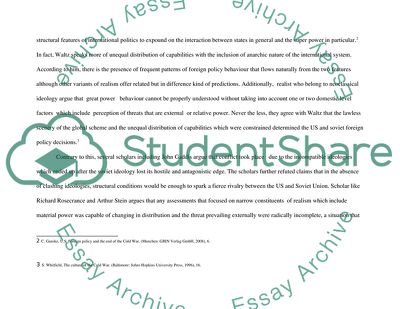Cite this document
(The USSR in the Context of the Cold War: the Foreign Policy of the United States Essay Example | Topics and Well Written Essays - 1500 words, n.d.)
The USSR in the Context of the Cold War: the Foreign Policy of the United States Essay Example | Topics and Well Written Essays - 1500 words. https://studentshare.org/history/1792034-why-do-you-think-the-end-of-cold-war-was-so-difficult-to-predict
The USSR in the Context of the Cold War: the Foreign Policy of the United States Essay Example | Topics and Well Written Essays - 1500 words. https://studentshare.org/history/1792034-why-do-you-think-the-end-of-cold-war-was-so-difficult-to-predict
(The USSR in the Context of the Cold War: The Foreign Policy of the United States Essay Example | Topics and Well Written Essays - 1500 Words)
The USSR in the Context of the Cold War: The Foreign Policy of the United States Essay Example | Topics and Well Written Essays - 1500 Words. https://studentshare.org/history/1792034-why-do-you-think-the-end-of-cold-war-was-so-difficult-to-predict.
The USSR in the Context of the Cold War: The Foreign Policy of the United States Essay Example | Topics and Well Written Essays - 1500 Words. https://studentshare.org/history/1792034-why-do-you-think-the-end-of-cold-war-was-so-difficult-to-predict.
“The USSR in the Context of the Cold War: The Foreign Policy of the United States Essay Example | Topics and Well Written Essays - 1500 Words”. https://studentshare.org/history/1792034-why-do-you-think-the-end-of-cold-war-was-so-difficult-to-predict.


